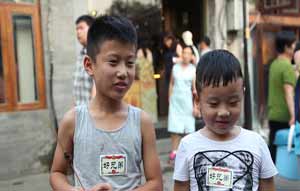Tiger Moms not always the best parents
Updated: 2013-08-13 07:25
By Kelly Chung Dawson in New York (China Daily)
|
||||||||

When Princeton professor and author Amy Chua published Battle Hymn of the Tiger Mother in 2011, the resulting media melee seemed to tap into a simmering vat of insecurities about the economic rise of China.
An excerpt published in the Wall Street Journal under the headline Why Chinese Mothers Are Superior triggered a heated debate about the pros and cons of a discipline style that discourages improvisation and creativity in favor of repetition and diligence.
Was the United States doing its children a disservice by not taking cues from the Chinese education system?
Novelist Kim Wong Keltner's new book, Tiger Babies Strike Back: How I Was Raised by a Tiger Mom but Could Not Be Turned to the Dark Side, responds with a resounding No, as an impassioned ode to "all the lonely, lost kids who aren't going to get into Harvard or Berkeley", Keltner says.
"Many Asians in the US are facing an identity crisis today, because we've been pigeonholed into stereotypes of success," she says. "Not enough of us are saying, I choose not to fit into this one box that my parents and the world have defined for me. Amy Chua's kids obviously turned out great, but it's only when kids turn out great that we can laugh about it.
"There's this entire group of kids out there who feel lonely and anxious because they're not necessarily going to be successful in that same way, and I want my book to be a message in a bottle to those kids," Keltner adds.
In descriptions of her strained relationship with her own "Tiger Mother", Keltner likens the relief of a post-visit return home to the feeling of having gnawed off her own paw to escape the metal teeth of a spring-loaded trap.
"How many emotional body slams can we take before ending up with permanent brain damage?" she asks.
Her own parenting approach today is a rebellion against what she sees as a cold pragmatism that robs children of their voices, an argument echoed recently in a study by University of Texas-Austin psychology professor Su-yeong Kim.
Kim's study demonstrated that children raised in Tiger Mother-style households have higher rates of depression - and lower grades.
Naturally, the report set off another wave of media coverage linked to Chua's book.
"People keep trying to pit me against Kim Wong Keltner, or to ask me to comment on that parenting study, and I keep telling them 'Look, all I did was write my personal family story,'" Chua says.
What much of the media coverage has failed to mention: The bottom line of Chua's book was that parenting is never one-size-fits-all. What worked with her first daughter was a resolute failure with her second, who ultimately succeeded not because of Chua's "Tiger Mother" parenting, but in spite of it.
While the marketing for Battle Hymn of the Tiger Mother seemed to target Western audiences, Tiger Babies Strike Back will likely resonate most with Asian-American readers.
Keltner's warm, frank voice intercuts humor with emotional weight, and the lives she describes will surely ring true to the children of immigrant parents.
Chinese-American women of earlier eras were often poor, and more likely to have been focused on making ends meet than fretting over identity, she argues. It's within that context that these women, now in their later years, have applied their own experiences to motherhood.
Keltner notes that Asian-American women have the highest rate of suicide among senior citizens of any ethnicity.
Pressure to fit stereotypical ideas of success, intelligence and beauty can be incredibly harmful for people who don't naturally fit those standards, she says. A reticence about discussing flaws or problems also holds many Asian-Americans back for fear of shaming their families.
"So many Asians have this sense that they have something to say, but they're waiting for some kind of permission that's never going to come," she says.
"You're taught to not make a spectacle of yourself, and I guess I have just the right combination of bravery and stupidity to say 'Hey, how come no one is pointing out that the Tiger Mother idea is perpetuating a harmful stereotype and potentially hurting kids?' I wanted to mix it up, because there is an alternative."
kdawson@chinadailyusa.com
(China Daily 08/13/2013 page19)

 Victoria Beckham S/S 2014 presented during NYFW
Victoria Beckham S/S 2014 presented during NYFW
 'Despicable' minions upset Depp's 'Lone Ranger' at box office
'Despicable' minions upset Depp's 'Lone Ranger' at box office
 'Taken 2' grabs movie box office crown
'Taken 2' grabs movie box office crown
 Rihanna's 'Diamonds' tops UK pop chart
Rihanna's 'Diamonds' tops UK pop chart
 Fans get look at vintage Rolling Stones
Fans get look at vintage Rolling Stones
 Celebrities attend Power of Women event
Celebrities attend Power of Women event
 Ang Lee breaks 'every rule' to make unlikely new Life of Pi film
Ang Lee breaks 'every rule' to make unlikely new Life of Pi film
 Rihanna almost thrown out of nightclub
Rihanna almost thrown out of nightclub
Most Viewed
Editor's Picks

|

|

|

|

|

|
Today's Top News
Going green can make good money sense
Senate leader 'confident' fiscal crisis can be averted
China's Sept CPI rose 3.1%
No new findings over Arafat's death: official
Detained US citizen dies in Egypt
Investment week kicks off in Dallas
Chinese firm joins UK airport enterprise
Trending news across China
US Weekly

|

|







